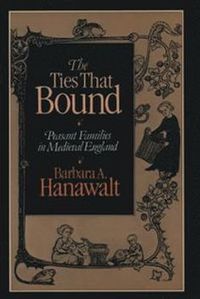
spara 66%
1 säljare
The Ties That Bound Upplaga 2
Barbara A. Hanawalt's richly detailed account offers an intimate view of everyday life in Medieval England that seems at once surprisingly familiar and yet at odds with what many experts have told us. She argues that the biological needs served by the family do not change and that the ways fourteenth- and fifteenth-century peasants coped with such problems as providing for the newborn and the aged, controlling premarital sex, and alleviating the harshness of their material environment in many ways correspond with our twentieth-century solutions.Using a remarkable array of sources, including over 3,000 coroners' inquests into accidental deaths, Hanawalt emphasizes the continuity of the nuclear family from the middle ages into the modern period by exploring the reasons that families served as the basic unit of society and the economy. Providing such fascinating details as a citation of an incantation against rats, evidence of the hierarchy of bread consumption, and descriptions of the games people played, her study illustrates the flexibility of the family and its capacity to adapt to radical changes in society. She notes that even the terrible population reduction that resulted from the Black Death did not substantially alter the basic nature of the family.
Upplaga: 2a upplagan
Utgiven: 1989
ISBN: 9780195045642
Förlag: OUP Oxford
Format: Häftad
Språk: Engelska
Sidor: 364 st
Barbara A. Hanawalt's richly detailed account offers an intimate view of everyday life in Medieval England that seems at once surprisingly familiar and yet at odds with what many experts have told us. She argues that the biological needs served by the family do not change and that the ways fourteenth- and fifteenth-century peasants coped with such problems as providing for the newborn and the aged, controlling premarital sex, and alleviating the harshness of their material environment in many ways correspond with our twentieth-century solutions.Using a remarkable array of sources, including over 3,000 coroners' inquests into accidental deaths, Hanawalt emphasizes the continuity of the nuclear family from the middle ages into the modern period by exploring the reasons that families served as the basic unit of society and the economy. Providing such fascinating details as a citation of an incantation against rats, evidence of the hierarchy of bread consumption, and descriptions of the games people played, her study illustrates the flexibility of the family and its capacity to adapt to radical changes in society. She notes that even the terrible population reduction that resulted from the Black Death did not substantially alter the basic nature of the family.
Begagnad bok
145 kr420 krSpara 275 kr (66%) mot nypris
Fri frakt & skickas inom 1-3 vardagar
Köpskydd med Studentapan
Varje köp täcks av Studentapans köpskydd som säkerställer att boken kommer fram, att du får rätt bok och att skicket stämmer överens med beskrivning.



